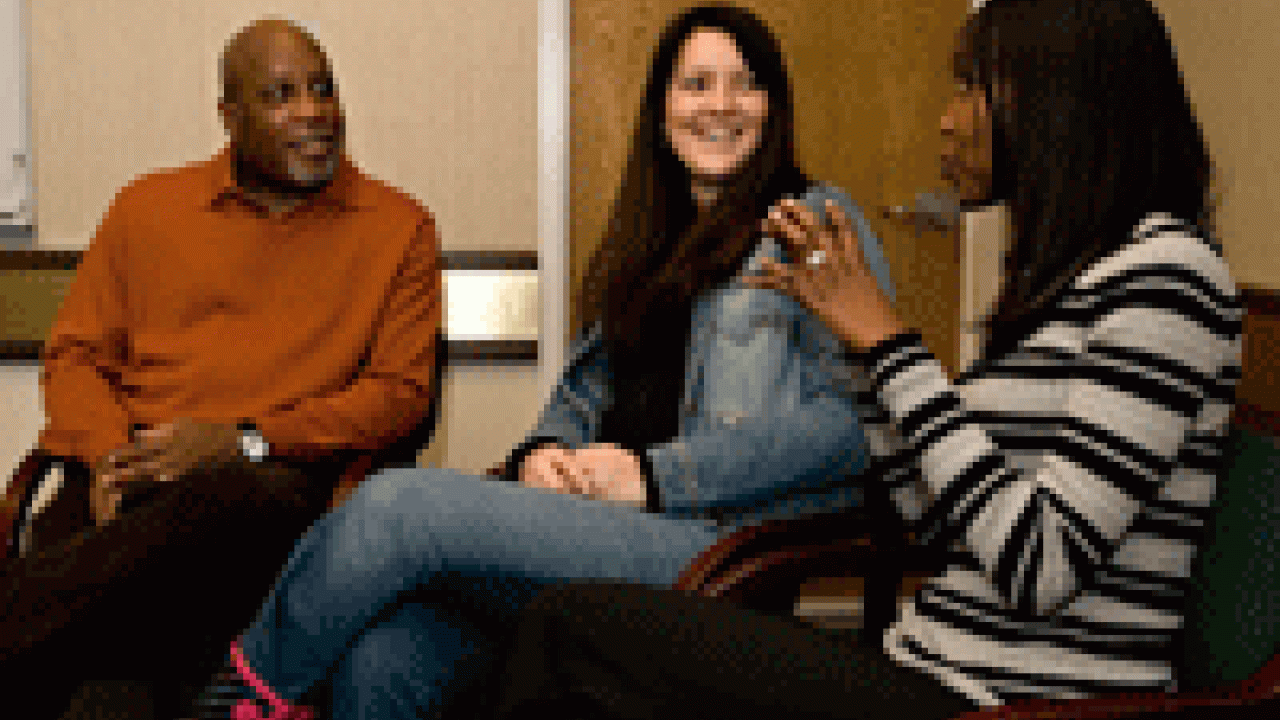UC Davis faculty and staff alike come into contact with and positively influence students on a daily basis.
They are mentors all, and they see no reason to stop just because they are retired. So, through the Retiree Center, emeriti and former staff members are hooking up with the TRiO Scholars Program, comprised mostly of students who are the first in their families to go to college.
Aggie Costantini worked on campus for 17 years as an adviser in International Student Services and later as an administrative assistant in Graduate Studies, retiring in 1993. All those years, she was a mentor to students without thinking about it.
"This program (through the Retiree Center) validates what I had been doing all along," said Costantini, who is one-half of a TRiO mentor team with her husband, political science professor emeritus Ed Costantini.
Similarly, Calvin Handy was an unofficial mentor for years during his 30-year career in law enforcement with UC, first on the Berkeley campus and then at Davis, where he retired at the end of 2004 after 12 years as police chief.
"Students just naturally gravitated toward me, whether they were working in the department or if they were outside and looking for a career in law enforcement, typically when they were at a deciding point," Handy said.
He was master of ceremonies at last week's Mentorship Resource Fair, a new event organized by the Retiree Center and the TRiO Scholars Program. He recalled a couple of mentors in his life, including the grandmother who raised him.
Trimaine Davis knew exactly what Handy was talking about, because Davis' grandmother raised him. Davis came up from San Diego State University to be the guest speaker at the Mentorship Resource Fair.
"Mentors are living examples for the next person coming up," said Davis, a San Diego State graduate who works as assistant coordinator of the university's Access Initiatives.
Part of his job involves outreach to students at five middle schools in impoverished southeast San Diego. He wants to see those students go to college, and he encourages them to keep on track academically.
To work at a university is a privilege, he said. "We all have a unique opportunity to give back at all times."
UC Davis fourth-year student Ann Marie Sanchez found help at home from brother Eric, who graduated before her from UC Davis and now works as an adviser for the TRiO Scholars Program. (TRiO, by the way, does not stand for anything other than the three federally funded programs that originally comprised support service.)
In a talk at the Mentorship Resource Fair, Ann Marie Sanchez said mentoring works both ways. "It's about knowing when to be a good mentor to others, so you can help them succeed, and knowing when you need to be mentored," said Sanchez, a double major in international relations and French, and who this year serves as a student assistant to the chancellor.
Other students, like most of those in the TRiO program, have no one at home to talk to about college.
Such was the case with Esmeralda Garcia, a third-year student majoring in sociology with an emphasis in law and society. She is from a farmworker family in Richgrove, in the southern San Joaquin Valley. Garcia said she found UC Davis to be lacking in diversity — with few Hispanics like her.
"My first year I didn't like it very much," she said during an interview a day after the Mentorship Resource Fair. "I didn't feel like I fit in. I wanted to go home."
After that rough first year, though, she found a source of cultural belonging when she started working in the after-school program at Dingle Elementary School in Woodland. And she joined Danzantes del Alma, the UC Davis Mexican folklorico dance troupe.
Also during her second year, she decided to take up the TRiO program on its offer of matching her with a mentor. She went to the opening mixer and met Chief Handy.
They had an instant connection: "I think I matched up the two of them before they left the room," Donelle Davis said. "They had such good chemistry."
Davis and Doreen Barcellona Strnad built the TRiO partnership with emeriti and retirees after Barcellona Strnad proposed the idea. She did so soon after being hired as the first coordinator of the new Retiree Center. "I wanted the Retiree Center to have true value during its first year and thought this program would be very worthwhile," Barcellona Strand said.
The value shows in the Handy-Garcia relationship. They have stayed in touch for about a year now, mostly by e-mail.
Handy said he quickly learned from Garcia that "she has a real passion for immigrant issues." She mentioned knowing someone who advocated for immigrants, and that she had thought about contacting him for career advice, but had not yet reached out to him.
Sometimes, all a student needs from a mentor is a nudge, and that is what Handy gave Garcia. "It's teaching in a way, but really it's positive listening, and true, honest feedback," Handy said.
Today, a confident Garcia is mentoring her fourth-grade sister, who recently had trouble with her math homework after missing a lesson at school back in Richgrove. Garcia's advice: Do not hesitate to go talk with your teacher.
And the mentoring goes on. As Garcia and Handy left their Dateline interview, they were setting up a lunch date for the following week.
The Retiree Center is planning a pizza party from 5 to 7 p.m. Feb. 7 for mentors and their students, and for emeriti and retirees interested in being mentors. For more information, call Retiree Center, (530) 752-5182.
Media Resources
Clifton B. Parker, Dateline, (530) 752-1932, cparker@ucdavis.edu
